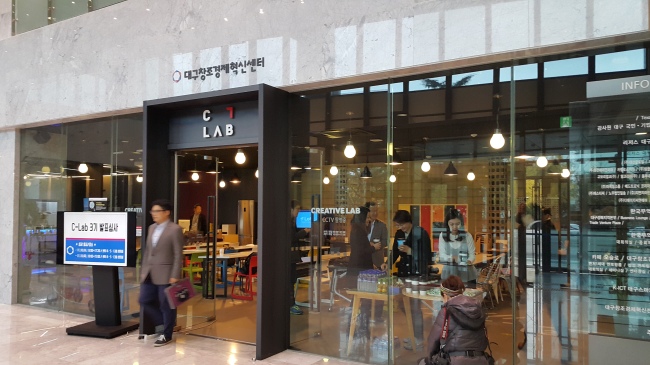Daegu creative center leads disruptive innovation
Government, Samsung team up to attract start-ups
By 김영원Published : Nov. 22, 2015 - 17:02
DAEGU -- A mainspring of the blazing economic growth of South Korea in just half a century after the 1950-53 Korean War was the export-oriented policy, which fostered the creation of competitive conglomerates in a variety of industrial sectors.
The export-driven initiative propelled the nation, which had been regarded as a have-not country, to the upper echelon of the world’s economies.
Today’s rapidly changing industry landscape coupled with fast technology development, however, requires global governments and businesses to deploy different approaches to overcome economic challenges and achieve innovation.

Samsung Group, the largest conglomerate here, in cooperation with the central and Daegu City governments, is nurturing start-ups that would disrupt the traditional markets in the nation’s fourth-largest city. Daegu -- located in the Yeongnam region -- was home to trading firm Samsung Trading Company (now Samsung C&T), the de facto holding firm of Samsung Group.
“What we are doing here is like planting seedlings, preparing to help businesses -- now fledgling though -- to take initiatives in the future industries for the next 50 or 100 years,” said Kim Sun-il, the chief executive of the Daegu Center for Creative Economy and Innovation, the first of the 17 creative centers built across the nation jointly by the Korean government and 15 conglomerates, including Samsung Group, Hyundai Motor Group and SK Group.
The number of the innovation centers totals 19 when counting two privately run centers.
Kim said the start-up program at the Daegu creative center is one of a kind since it not only provides financial aid for the participants, but also supports them with Samsung’s assets and human resources, for example, connecting them with other partners for marketing or sales channels at home and abroad.
“Being able to share their business ideas and collaborate with other start-ups are some of the perks at the center, and those supports are not available in any other start-up program, including Google’s,” he added.
Walnut, a developer of a textile design software, is a budding enterprise, aiming to bring change to the world’s textile design software market, which has been dominated by just a couple companies over the past 20 years.
“I realized that I had no knowledge whatsoever in other stuff like management except software development after failing to ink contracts with Chinese firms in the last steps of contract negotiation last year,” said Lee Kyung-dong, CEO of the Daegu-based firm.

He said he was able to receive a lot of help on the management side at the creative center. After receiving seed money from the center, at 200 million won ($173,000) in total, the design software developer also received further funding from Samsung Venture Investment and Smilegate Investment, which would help the firm tap into the Chinese market in April next year.
Launched in September last year, the Daegu creative center picks around 20 start-ups every six months and provides them with a range of support measures, from funding and staff training courses to technical advice and management consulting.
Of the first group of 18 firms, selected among a total of 3,700 applicants last year, 17 graduated from the start-up programs at the Daegu center and generated around 1 billion won. The sale figures could seem infinitesimal compared to an established company, but it is remarkable since they started everything from scratch, according to Kim.
The sales earned by the second batch of 18 start-ups increased to 1.7 billion won.
Samsung has invested around 10 billion won of funding in 48 ventures and start-ups since last year, and will invest another 10 billion won to nurture small businesses through 2019.
The Daegu innovation center is also eyeing the global market by attracting firms at two start-up incubators run by Samsung in New York and Silicon Valley and receiving applications from global start-ups around the world.
The creative center will move to the Daegu Samsung Creative Campus to be built on the former site of textile firm Cheil Industries in Daegu next November. The DSCC will house a museum, a cultural center, offices and a memorial hall for late Samsung founder Lee Byung-chul.
By Kim Young-won (wone0102@heraldcorp.com)









![[Weekender] Korean psyche untangled: Musok](http://res.heraldm.com/phpwas/restmb_idxmake.php?idx=644&simg=/content/image/2024/05/02/20240502050841_0.jpg&u=)







![[Eye Interview] 'If you live to 100, you might as well be happy,' says 88-year-old bestselling essayist](http://res.heraldm.com/phpwas/restmb_idxmake.php?idx=652&simg=/content/image/2024/05/03/20240503050674_0.jpg&u=)
